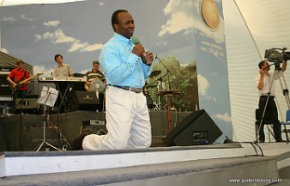Saving the Soviets

Whenever I speak on global Christianity, I can count on getting at least one question along the lines of “So do you think Africans might start sending missionaries to convert Europe or America someday?” My response usually begins with the story of Sunday Adelaja, which is so radically counterintuitive for anyone brought up during the cold war as to sound like the start of a bad joke: “Did you hear about the African who tried to start a church in the Soviet Union?”
The reality, though, is anything but trivial. Though he has gone through some recent difficulties, Sunday Adelaja remains a startling personification of worldwide shifts in Christianity.
His story begins with a very different kind of global evangelism, namely the efforts of the Soviet Union to support anti-imperialist causes worldwide. In pursuit of its mission, it recruited thousands of young people from what used to be called the Third World, educating them at Soviet universities in order to send them back to their home countries as faithful adherents of communism.
Read our latest issue or browse back issues.
When Sunday Sunkanmi Adelaja traveled from Nigeria to Minsk in 1987, he could not have known that he was one of the last of those recruits. Within four years, the Soviet Union itself collapsed. Adelaja moved to the newly independent nation of Ukraine. In 1994, with a few friends, he formed a Christian mission known as the Word of Faith Bible Church, which ultimately evolved into the Embassy of the Blessed Kingdom of God for All Nations.
In this instance at least, a church’s decision to choose a grandiose name really did reflect impressive growth. That circle of friends soon swelled to become one of Europe’s most successful evangelical churches, claiming 20,000 members at the main facility in Kiev and hundreds of daughter and satellite churches around Ukraine. The Embassy also took its “all nations” name very seriously, planting new churches across Western Europe and in several former Soviet republics.
The membership was overwhelmingly white. When the Embassy’s website posted testimonials of healing, it showed people with classic Slavic names and faces reporting how they had been healed of AIDS, cancer, even raised from the dead—and it showed a black African pastor as a messenger from God. Adelaja became a prolific author of inspirational books.
The Embassy also wielded remarkable political influence. It supported the Orange Revolution of 2004–2005, and it still counts some leading Ukrainian politicians among its members. The most prominent is Leonid Chernovetskyi, banker and philanthropist
as well as Kiev’s mayor. Chernovetskyi leads the Christian Liberal Party of Ukraine—another title that sounds truly odd to anyone who recalls the Soviet era. Conceivably, Adelaja could yet find himself wielding real influence in the government.
In recent years, however, Adelaja’s ministry has come under repeated attack. Many evangelicals are suspicious of his prosperity gospel teachings. Much more damaging has been the barrage of criminal charges alleging that he was complicit in a collapsed financial enterprise that was characterized as a multimillion-dollar Ponzi scheme. To his critics, Adelaja’s church was both a cult and a scam.
The case remains in process and will remain so for years to come, making it all but impossible to determine the facts. Adelaja’s defenders respond, reasonably enough, that all former Soviet states use criminal charges to destroy critics and political enemies, and that this prosecution must be seen in this context. The business in question failed as a result of the general financial crisis that swept the world in 2008, not because of any impropriety. Whatever the truth of the charges, the case has harmed the reputation of both the pastor and his church, and membership figures have suffered.
Even if we assume the worst, Adelaja’s career still points to some developments in Europe’s religious scene that would have inconceivable not long ago. Despite his celebrity, he is only one of many African or Asian evangelists who have built major churches in Europe. Most have shown themselves just as ambitious in their territorial scope—they aim to become an embassy to all nations. Some at least have reached out successfully to white audiences that are thirsty for the inspiration and passion these churches offer.
One more lesson: physically accommodating a church of 20,000 might seem an enormously difficult project, but fortunately for the Embassy of the Blessed Kingdom it was fairly easy to do in a society that had through the decades built spectacularly large complexes and stadiums to host meetings of the Communist Party and affiliated groups. At long last, then, we can explain the historical role of Soviet communism: it was to build structures large enough to hold evangelical congregations.






